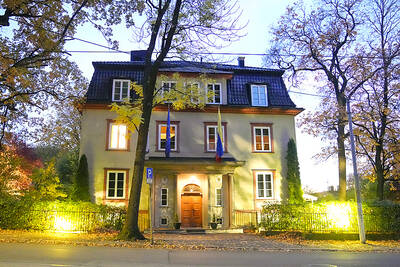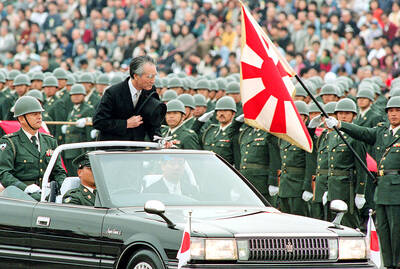German Minister of the Economy Sigmar Gabriel is raising hackles among conservatives in Germany’s coalition government with plans to tighten rules on arms exports, amid tit-for-tat sanctions between the West and Russia.
“If you’re not very careful, [selling arms abroad] can very quickly become a deal with death,” Gabriel, who is also German vice chancellor, said recently on public television.
Normally, the position of deputy chancellor is largely a symbolic one, but Gabriel, a Social Democrat, is taking advantage of the absence on holiday of German Chancellor Angela Merkel to lobby publicly for a topic close to his heart.
Exporting arms was already an issue for his Social Democratic Party (SPD) during last year’s general election campaign, but with the crisis in Ukraine, it has taken on added currency.
Gabriel believes that European sanctions against Moscow do not go far enough, and last week he blocked a major contract for German company Rheinmetall to provide a fully equipped training camp to Russia.
The minister is not looking to change Germany’s current laws on arms exports, but he wants authorities to be much more watchful when awarding export licences, particularly with regard to the country buying the weapons and their record on human rights.
Last year, Merkel’s previous administration authorized 5.8 billion euros’ (US$7.8 billion) worth of arms exports, 62 percent of which were destined for non-NATO countries such as Algeria, Qatar and Saudi Arabia, with Gabriel particularly concerned about the latter.
However, the minister’s plan, seen by some as an attempt to reach out to the opposition Greens and far-left Linke party in the distant eventuality of a post-Merkel alliance, is rattling some conservatives. The head of the Christian Social Union (CSU) party, Horst Seehofer, accused Gabriel of acting “without a concept and without a compass” and of endangering jobs.
“German companies will disappear from the market or relocate abroad,” he said.
The CSU is the Bavarian sister party of Merkel’s Christian Democratic Union, and the wealthy southern state is home to companies such as Airbus Defence and Space, tank maker Krauss Maffei Wegmann — which plans to tie-up with French rival Nexter — and guided-missile maker Diehl.
Germany’s defense industry is tight-lipped about its actual sales, preferring instead to publish its output. In 2011, the most recent data available, the sector’s output amounted to 22.6 billion euros. It employs nearly 100,000 people directly while more than 200,000 are employed by sub-contractors and suppliers.
According to the Stockholm International Peace Research Institute, Germany is the world’s third-biggest exporter of arms, after the US and Russia.

The Venezuelan government on Monday said that it would close its embassies in Norway and Australia, and open new ones in Burkina Faso and Zimbabwe in a restructuring of its foreign service, after weeks of growing tensions with the US. The closures are part of the “strategic reassignation of resources,” Venezueland President Nicolas Maduro’s government said in a statement, adding that consular services to Venezuelans in Norway and Australia would be provided by diplomatic missions, with details to be shared in the coming days. The Norwegian Ministry of Foreign Affairs said that it had received notice of the embassy closure, but no

A missing fingertip offers a clue to Mako Nishimura’s criminal past as one of Japan’s few female yakuza, but after clawing her way out of the underworld, she now spends her days helping other retired gangsters reintegrate into society. The multibillion-dollar yakuza organized crime network has long ruled over Japan’s drug rings, illicit gambling dens and sex trade. In the past few years, the empire has started to crumble as members have dwindled and laws targeting mafia are tightened. An intensifying police crackdown has shrunk yakuza forces nationwide, with their numbers dipping below 20,000 last year for the first time since records

EXTRADITION FEARS: The legislative changes come five years after a treaty was suspended in response to the territory’s crackdown on democracy advocates Exiled Hong Kong dissidents said they fear UK government plans to restart some extraditions with the territory could put them in greater danger, adding that Hong Kong authorities would use any pretext to pursue them. An amendment to UK extradition laws was passed on Tuesday. It came more than five years after the UK and several other countries suspended extradition treaties with Hong Kong in response to a government crackdown on the democracy movement and its imposition of a National Security Law. The British Home Office said that the suspension of the treaty made all extraditions with Hong Kong impossible “even if

Former Japanese prime minister Tomiichi Murayama, best known for making a statement apologizing over World War II, died yesterday aged 101, officials said. Murayama in 1995 expressed “deep remorse” over the country’s atrocities in Asia. The statement became a benchmark for Tokyo’s subsequent apologies over World War II. “Tomiichi Murayama, the father of Japanese politics, passed away today at 11:28am at a hospital in Oita City at the age of 101,” Social Democratic Party Chairwoman Mizuho Fukushima said. Party Secretary-General Hiroyuki Takano said he had been informed that the former prime minister died of old age. In the landmark statement in August 1995, Murayama said